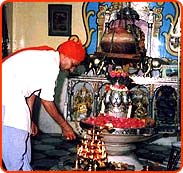




Introduction Hinduism is also known as "Sanatana Dharma" to Hindus. In Sanskrit, the original language of India, 'Sanatana' means Everlasting and 'Dharma', by a crude translation, means Religion. The Everlasting Religion, Hinduism was founded, exists and flourishes in India. What is Hinduism? Is it a religion or is it a culture? The truth is - it is both a religion and a way of life. India gave to the world the original, oldest and most profound philosophy of life. The brilliant ancestors of present-day indians explored the Truth behind our existence and gave several philosophies and theories to define the Truth. At the same time, they created a set of rules for "good living" on this earth. The philosophical concepts that Indians gave to mankind are eternal and constitute no religion by themselves. However, the rules for good or "Dharmic" living that they laid down constitute the Hindu religion. This article will refer to "Hinduism" for both the philosophy and the religion, for purposes of simplicity.Sanatana Dharma does not have a starting point in history, does not have a founder, and has no Church. The sages who shaped the Hindu religion merely reiterated the teachings of the Vedas, the Hindu scriptures (most of which is unwritten). The Vedas are believed to have no origin. In ancient India, the Vedas formed the educational system and broadly comprised all the different spheres of life, such as spiritual, scientific, medical and so on. Purpose The purpose of this web page is not to "sell" Hinduism or to seek conversions. As a matter of fact, Hinduism does not believe in conversions. More on that topic follows later. The purpose of this page is to simply try and give a high-level overview of the religion and the culture that continues to fascinate a lot of people in the West and in America. The Mother of All Alphabets Click on the rotating image above to view the symbol in the image.The symbol is an Alphabet in the Sanskrit language and is the most important symbol in






